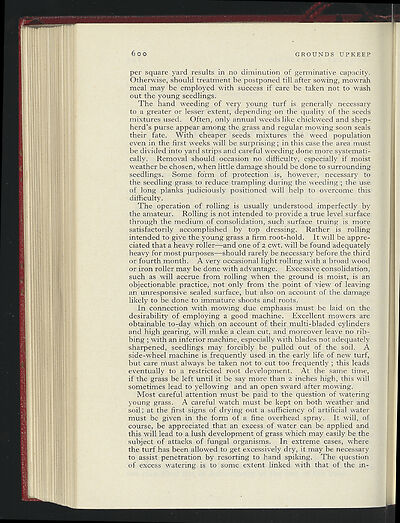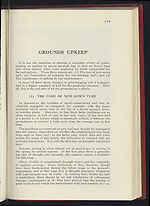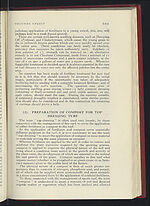1938-39
(634)
Download files
Complete book:
Individual page:
Thumbnail gallery: Grid view | List view

600
GROUNDS UPKEEP
per square yard results in no diminution of germinative capacity.
Otherwise, should treatment be postponed till after sowing, mowrah
meal may be employed with success if care be taken not to wash
out the young seedlings.
The hand weeding of very young turf is generally necessary
to a greater or lesser extent, depending on the quality of the seeds
mixtures used. Often, only annual weeds like chickweed and shep-
herd's purse appear among the grass and regular mowing soon seals
their fate. With cheaper seeds mixtures the weed population
even in the first weeks will be surprising; in this case the area must
be divided into yard strips and careful weeding done more systemati-
cally. Removal should occasion no difficulty, especially if moist
weather be chosen, when little damage should be done to surrounding
seedlings. Some form of protection is, however, necessary to
the seedling grass to reduce trampling during the weeding; the use
of long planks judiciously positioned will help to overcome this
difficulty.
The operation of rolling is usually understood imperfectly by
the amateur. Rolling is not intended to provide a true level surface
through the medium of consolidation, such surface truing is more
satisfactorily accomplished by top dressing. Rather is rolling
intended to give the young grass a firm root-hold. It will be appre-
ciated that a heavy roller—and one of
2
cwt. will be found adequately
heavy for most purposes—should rarely be necessary before the third
or fourth month. A very occasional light rolling with a broad wood
or iron roller may be done with advantage. Excessive consolidation,
such as will accrue from rolling when the ground is moist, is an
objectionable practice, not only from the point of view of leaving
an unresponsive sealed surface, but also on account of the damage
likely to be done to immature shoots and roots.
In connection with mowing due emphasis must be laid on the
desirability of employing a good machine. Excellent mowers are
obtainable to-day which on account of their multi-bladed cylinders
and high gearing, will make a clean cut, and moreover leave no rib-
bing ; with an inferior machine, especially with blades not adequately
sharpened, seedlings may forcibly be pulled out of the soil. A
side-wheel machine is frequently used in the early life of new turf,
but care must always be taken not to cut too frequently ; this leads
eventually to a restricted root development. At the same time,
if the grass be left until it be say more than
2
inches high, this will
sometimes lead to yellowing and an open sward after mowing.
Most careful attention must be paid to the question, of watering
young grass. A careful watch must be kept on both weather and
soil; at the first signs of drying out a sufficiency of artificial water
must be given in the form .of a fine overhead spray. It will, of
course, be appreciated that an excess of water can be applied and
this will lead to a lush development of grass which may easily be the
subject of attacks of fungal organisms. In extreme cases, where
the turf has been allowed to get excessively dry, it may be necessary
to , assist penetration by resorting to hand spiking. The question
of excess watering is to some extent linked with that of the in-
GROUNDS UPKEEP
per square yard results in no diminution of germinative capacity.
Otherwise, should treatment be postponed till after sowing, mowrah
meal may be employed with success if care be taken not to wash
out the young seedlings.
The hand weeding of very young turf is generally necessary
to a greater or lesser extent, depending on the quality of the seeds
mixtures used. Often, only annual weeds like chickweed and shep-
herd's purse appear among the grass and regular mowing soon seals
their fate. With cheaper seeds mixtures the weed population
even in the first weeks will be surprising; in this case the area must
be divided into yard strips and careful weeding done more systemati-
cally. Removal should occasion no difficulty, especially if moist
weather be chosen, when little damage should be done to surrounding
seedlings. Some form of protection is, however, necessary to
the seedling grass to reduce trampling during the weeding; the use
of long planks judiciously positioned will help to overcome this
difficulty.
The operation of rolling is usually understood imperfectly by
the amateur. Rolling is not intended to provide a true level surface
through the medium of consolidation, such surface truing is more
satisfactorily accomplished by top dressing. Rather is rolling
intended to give the young grass a firm root-hold. It will be appre-
ciated that a heavy roller—and one of
2
cwt. will be found adequately
heavy for most purposes—should rarely be necessary before the third
or fourth month. A very occasional light rolling with a broad wood
or iron roller may be done with advantage. Excessive consolidation,
such as will accrue from rolling when the ground is moist, is an
objectionable practice, not only from the point of view of leaving
an unresponsive sealed surface, but also on account of the damage
likely to be done to immature shoots and roots.
In connection with mowing due emphasis must be laid on the
desirability of employing a good machine. Excellent mowers are
obtainable to-day which on account of their multi-bladed cylinders
and high gearing, will make a clean cut, and moreover leave no rib-
bing ; with an inferior machine, especially with blades not adequately
sharpened, seedlings may forcibly be pulled out of the soil. A
side-wheel machine is frequently used in the early life of new turf,
but care must always be taken not to cut too frequently ; this leads
eventually to a restricted root development. At the same time,
if the grass be left until it be say more than
2
inches high, this will
sometimes lead to yellowing and an open sward after mowing.
Most careful attention must be paid to the question, of watering
young grass. A careful watch must be kept on both weather and
soil; at the first signs of drying out a sufficiency of artificial water
must be given in the form .of a fine overhead spray. It will, of
course, be appreciated that an excess of water can be applied and
this will lead to a lush development of grass which may easily be the
subject of attacks of fungal organisms. In extreme cases, where
the turf has been allowed to get excessively dry, it may be necessary
to , assist penetration by resorting to hand spiking. The question
of excess watering is to some extent linked with that of the in-
Set display mode to:
![]() Universal Viewer |
Universal Viewer | ![]() Mirador |
Large image | Transcription
Mirador |
Large image | Transcription
| Games and sports in the army > 1938-39 > (634) |
|---|
| Permanent URL | https://digital.nls.uk/248744848 |
|---|
| Description | 'Games and Sports in the Army' was an annual publication produced by the British War Office between the 1930s and 1960s. This included the Second World War. It outlines the rules and regulations for games and sports played by members of the armed forces. It features names and photographs of team members, and examples of contemporary advertising. |
|---|---|
| Shelfmark | GWB.52 |

